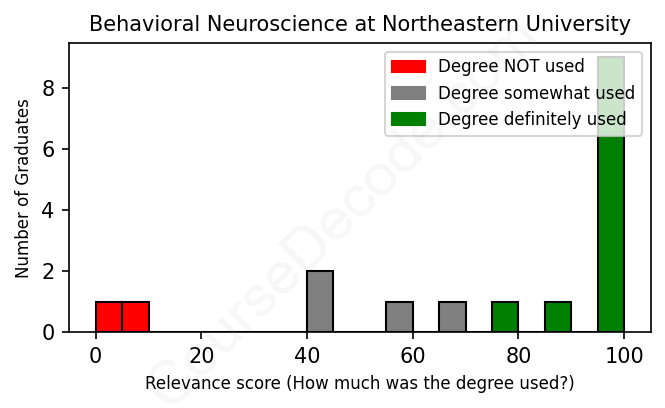
First, some facts. Of the Behavioral Neuroscience graduates from Northeastern University we've analyzed , here's how many have used (or NOT used) their degree in their career:

These are estimates based on AI analysis of 17 LinkedIn profiles (see below).
The verdict? Above average. Overall, with an average relevance score of 75%, Behavioral Neuroscience graduates from Northeastern University have a higher likelihood (+8%) of finding work in this field compared to the average graduate across all fields:
And for comparison, here's the chart for all profiles we've looked at across all degrees.
Also, after graduating, 58% of these graduates have pursued further education other than another Bachelor's degree (such as a Masters degree or other), compared to the average across all profiles of 35%. This suggests you may need more than just a Bachelors degree to be competitive as a Behavioral Neuroscience graduate.
See the details:
|
Relevance score: 100% We think this person has gone into a career highly relevant to their degree. We think this person has gone into a career highly relevant to their degree.
DEGREE INFOGraduated in 2016 from Northeastern University with a Bachelor's Degree in Behavioral Neuroscience. No other secondary education since. JOB HISTORY SINCE GRADUATIONResearch Assistant II Beth Israel Deaconess Medical Center Jun 2016 - Feb 2018 Clinical Research Associate II  Beth Israel Deaconess Medical Center Feb 2018 - Present ABOUTNo information provided. |
The top 10 most common jobs done by the graduates we've analyzed (ranked most common to least) are:
When looking at the career paths of people who graduated with a degree in Behavioral Neuroscience from Northeastern University, it seems that many have gravitated toward healthcare and research-related positions. Common roles include Clinical Research Assistants, Research Technicians, and Physician Assistants, which all draw on their understanding of human behavior and brain function. These roles often involve direct research, patient interaction, or clinical trials, making them quite relevant to their studies in behavioral neuroscience. For instance, positions in clinical research are pivotal as they require the application of knowledge gained through their degree, allowing graduates to contribute meaningfully to science and healthcare.
That said, not every job listed aligns perfectly with the field. Some graduates have taken roles in unrelated domains like supply chain management or even retail, which don’t require the specialized knowledge from their studies. While those jobs might still benefit from some general skills related to human interaction or problem-solving, they don’t tap into the core of what behavioral neuroscience is about. Overall, it seems that while many have found their way into roles that directly relate to behavioral neuroscience, there's a significant portion whose jobs stray far from the intended field, indicating a diversity of paths taken post-graduation.
Here is a visual representation of the most common words in job titles for Behavioral Neuroscience graduates (this is across all Behavioral Neuroscience graduates we've analyzed, not just those who went to Northeastern University):

Graduates from the Behavioral Neuroscience program at Northeastern University often begin their careers in positions that closely relate to medical or research fields, suggesting they have a strong foundation that supports roles in healthcare and scientific inquiry. For instance, many early careers feature roles like Clinical Research Assistants, Medical Assistants, and even positions within organizations such as the Peace Corps. These first jobs generally last a couple of years, helping graduates gain relevant experience and skills in their fields. Laboratory or research roles appear to be particularly prevalent among alumni, indicating a common trajectory toward research and clinical settings right after graduation.
As for where these graduates find themselves five or ten years later, many continue to advance within the healthcare and research domains. For instance, some have moved on to become Physician Assistants, Genetic Counselors, and even Senior Research Associates or Project Managers in established research firms. Others pursued further education and training, leading to roles in specialized medical fields like anesthesiology or orthopedic surgery. While there are some who shifted into unrelated fields, like supply chain management, many appear to remain aligned with their behavioral neuroscience roots or broader medical careers, suggesting a solid career foundation built during their time at Northeastern. This indicates that a degree in Behavioral Neuroscience can lead to fulfilling and relevant career paths if graduates actively pursue opportunities that align with their studies.
Honestly, a Bachelor’s degree in Behavioral Neuroscience can be pretty challenging, but it really depends on your interests and strengths. At Northeastern University, like many places, you’ll dive into some heavy topics involving psychology, biology, and neuroscience, which means a good amount of memorization and analysis. The coursework often involves lab work, research projects, and statistics, which can be a bit tough if numbers and experiments aren’t your thing. That said, if you’re passionate about understanding how the brain and behavior connect, it can be super rewarding! Just be ready for some late nights studying and juggling multiple subjects, but it's totally manageable if you're dedicated.
Most commonly, in the LinkedIn profiles we've looked at, it takes people 4 years to finish a Bachelor degree in Behavioral Neuroscience.
Looking at the job paths of these Behavioral Neuroscience grads from Northeastern University, it seems like many of them have landed pretty solid positions, especially as they moved along in their careers. For example, those who pursued roles in clinical research or health-related fields gradually moved up to more specialized positions, which usually offer decent pay, like the anesthesiology resident and senior genetic counselors. Some also transitioned into more business-centric roles, like project managers, which can also be well-paying. That said, there were more entry-level roles early in their careers, like research assistants or technicians, that typically don't pay a lot. Overall, it looks like as they gained experience and specialized further, their earning potential improved significantly, suggesting they’re likely doing pretty well financially now!
Here is a visual representation of the most common words seen in the "about" section of LinkedIn profiles who have a Bachelor degree in Behavioral Neuroscience (this is across all Behavioral Neuroscience graduates we've analyzed, not just those who went to Northeastern University). This may or may not be useful:

Here are all colleges offering a Bachelor degree in Behavioral Neuroscience (ordered by the average relevance score of their Behavioral Neuroscience graduates, best to worst) where we have analyzed at least 10 of their graduates:
| College | Score | Count |
|---|---|---|
 Northeastern University Northeastern University
|
75 | 17 |